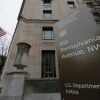Analysis | The Technology 202: Pinterest bans misinformation about voting and the census – The Washington Post

The Pinterest application. (Gabby Jones/Bloomberg News)
Ctrl + N
Pinterest is ramping up its efforts to crack down on political misinformation ahead of the 2020 election — a sign that the platform best known for lighthearted fare such as recipes, wedding planning and beauty tips is not immune from the challenges facing other major social media sites.
The company tells The Technology 202 that it will now remove any content that misleads people about where, when or how to vote. It is also promising to crack down on any hoaxes that could turn off people from participating in the census, as experts warn the count could be a key target for bad actors seeking to meddle with the U.S. democratic process. Pinterest’s new “civic participation” policy will apply to content from users’ posts and ads on the service.
“This is an Internet problem,” said Aerica Shimizu Banks, Pinterest’s lead for federal policy and social impact. The only way to address misinformation broadly, Banks adds, is for tech companies and government officials to work together.
Pinterest, like other tech companies, will report any count-related hoaxes to the U.S. Census Bureau so that the agency can debunk them and ensure they’re not spreading on other social networks.
While Facebook, Twitter and YouTube are primarily in the political glare when it comes to battling misinformation, today’s announcement is a reminder that any tech platform is vulnerable heading into 2020. Bad actors are changing their tactics to avoid detection amid escalating concerns about election meddling, and small companies are working to ensure their guards are up too.
To date, Pinterest says it hasn’t come across misinformation specific to voting or the census, Banks said. But its new policy is an effort to stay a step ahead.
“Thankfully we haven’t had too many issues yet,” said Pinterest spokeswoman Jamie Favazza. “But that’s the point of policy, to get ahead of it and make sure that we have policies that we work against so that if we do start finding more of this stuff, that we can effectively address it.”
Some 90 million people in the U.S. visit the social network each month to figure out what to cook for dinner, where to host their wedding or how to monetize a favorite hobby. “But interestingly enough, we’ve also seen tens of thousands of searches related to the census,” Banks says.
U.S. Census official recognize this, and they see partnering with Pinterest as key to their efforts to defend the 2020 count in addition to their work with other social media companies. Pinterest will display a banner at the top of search results so that as people look for “2020 Census,” “#becounted” and other popular terms, they can easily access the U.S. 2020 Census website for authoritative information.

Courtesy of Pinterest
Census officials see Pinterest as a means to communicate with a niche but significant audience: teachers. Teachers flock to Pinterest for lesson plans and classroom ideas, so officials are leveraging that to share census-related lesson plans to make sure that teachers can share accurate information about the count with their classes. That could also be a key avenue to communicating with parents, amid concerns that children will once again be undercounted in the census. Nearly 1 million children were left out of the 2010 census, and the government formed a task force to address the issue.
“The Census Bureau’s Pinterest page is a great way for teachers to access free, creative and interactive Statistics in Schools resources, including maps and classroom activities for K-12,” the bureau told me in a statement.
Other tech companies adopted similar policies in recent months. Facebook in December announced a similar ban on posts and ads that mislead about the census. Google in December said it prohibited ads and YouTube videos that aim to misinform about the 2020 count, and Twitter’s rules bar “misleading information about how to participate in an election or other civic event.”
Pinterest is adopting this stance after it had its own issues with Russian influence during the 2016 elections. As my colleague Elizabeth Dwoskin reported, the site became a “repository for thousands of political posts created by Russian operatives seeking to shape public opinion and foment discord in U.S. society.” The Russian trolls didn’t post directly on Pinterest, but unsuspecting users unwittingly posted their content to their boards.
Since then, the company has been increasing its efforts to identify and remove misinformation and disinformation, including working with outside groups, professionals and other tech companies.
“Even though political content isn’t popular on Pinterest, there’s a trickle down effect from other services from which people save content to their Pinterest accounts, and that’s why we’re working to proactively address it,” Favazza said. “More broadly, we’re always working to address adversarial behavior, meaning we proactively identify users who intentionally spread misinformation, spam and other policy-violating content, and take those accounts down.”
Correction: An earlier version of this article contained an incorrect breakdown of site visitors to Pinterest each month. It is 90 million Americans, not total.
BITS, NIBBLES AND BYTES

The U.S. Department of Justice building (REUTERS/Jim Bourg)
BITS: The Justice Department asked a federal court to block three U.S. telecommunications companies for allegedly flooding U.S. consumers with hundreds of millions of foreign-based robocalls, my colleague Matt Zapotosky reports. The crackdown is the first of its kind by the Justice Department and signals a more aggressive approach against the surging number of fraudulent calls.
Justice Department officials said that the companies named in the restraining orders were warned they were transmitting fraudulent calls but continued to allow them anyway. Fraudsters posing as government employees swiped millions of dollars from mostly elderly victims as a result, Matt reports.
The department filed two civil cases in federal court in Brooklyn. One is against Nicholas Palumbo, 38, and Natasha Palumbo, 33, of Scottsdale, Ariz., who ran TollFreeDeals.com and Sipretail.com. The other is against Jon Kahen, 45, of Great Neck, N.Y., who ran Global Voicecom, Global Telecommunication Services and KAT Telecom. No criminal charges were filed.
Assistant Attorney General Jody Hunt said he hoped the cases would “serve as a warning” to other fraudsters.
Congress passed a bill late last year that gave the Federal Communications Commission and law enforcement greater authority to go after robocallers. The bill also directed the Justice Department to launch a working group focused on prosecuting them.

Amazon CEO Jeff Bezos. (John Locher/AP)
NIBBLES: Apple marketed its high-end smartphones as some of the most secure and private devices available in the market. But the alleged hack of Jeff Bezos underscores that what happens on the iPhone doesn’t always stay on the iPhone, my colleagues Reed Albergotti, Craig Timberg and Jay Greene report.
Security researchers say that the Amazon chief executive and Washington Post owner probably fell victim to the phone’s Achilles’ heel. Apple’s defenses are so hard to break that once bad actors are in, they can largely go undetected. Apple’s approach to finding and fixing security flaws is very controversial in the security community because the company is so secretive about it.
The incident is also a reminder of how vulnerable mobile phones remain to attacks, even as tech companies encrypt more data to protect consumers from mass surveillance. A phone breach can expose secret and embarrassing personal information in seconds without a trace. Security experts are divided on how to address the vulnerabilities, and if anything can even be done about it.
“A lot of Apple security is amazing and really benefits the average user, but once you’re a target of an advanced adversary or three letter agency, the advanced security of these devices can be used against you,” Patrick Wardle, who worked for the National Security Agency and is now principal security researcher for Minneapolis-based software maker Jamf, told my colleagues.
Apple spokesman Todd Wilder declined to comment on the company’s security strategy. Amazon spokesman Jay Carney declined to comment on the hacking of Bezos’s phone.

Lime-S scooters by LimeBike are now available for rent in Washington. (Luz Lazo/The Washington Post)
BYTES: Scooter drivers are vexing local officials and pedestrians by riding on sidewalks, even in cities where it’s illegal. Lime is responding with a new pilot that notifies riders when they aren’t following the rules of the road.
Lime launched the test in San Jose, Calif., yesterday — just weeks after the company pulled out of five other major cities amid regulatory hurdles. For trips where 50 percent or more of the ride was detected on a sidewalk, Lime will send a push notification to the rider. Nick Shapiro, Lime’s Head of Trust and Safety, told our researcher Tonya Riley that the notification is aimed at educating riders who might not know where they can and can’t ride (especially because rules can vary from city to city).
Lime is basing its notifications on a statistical model it claims can determine whether a rider was on the sidewalk or road with up to 95 percent accuracy. The company will then share that anonymized data with the city so it can see where riders are more likely to ride on sidewalks, which is illegal in San Jose.
“The best way we are going to keep riders and pedestrians safe is making sure there’s proper infrastructure in the cities where we operate,” Shapiro told Tonya.
This isn’t the first time Lime pushed to help cities build infrastructure that will benefit its business model. Lime also shared data with the cities of Austin and Santa Monica, Calif., to help develop a mobility lane and parking areas, respectively.
PRIVATE CLOUD
— News from the private sector:
Facebook’s $130 million ‘Supreme Court’ will be able to overrule even Mark Zuckerberg
Facebook is spending $130 million to create an oversight board that can overrule even Mark Zuckerberg himself, and today it got its first director.
Business Insider
How Amazon escapes liability for the riskiest products on its site
Who’s at fault when something you buy on Amazon goes bad?
The Verge
Chinese health authorities said Tuesday that the coronavirus outbreak has killed 106 people and infected 4,515.
CNBC
PUBLIC CLOUD
— News from the public sector:
Key Lawmaker Eyes Pre-Election Changes to Tech Liability Shield
Representative Jan Schakowsky has asked her staff to examine changes to a liability shield that protects tech platforms such as Facebook Inc. from lawsuits because of her concerns about how fake information could be used in the 2020 presidential election.
Bloomberg
National Security
A New York Times journalist was targeted by spyware linked to Saudi Arabia, according to report
The analysis by Citizen Lab follows a U.N. investigation implicating the Saudi crown prince in the hack of Jeff Bezos’s phone.
Ellen Nakashima
Lawmakers claim progress on online privacy bill
Key lawmakers maintained Tuesday that they are making progress in their efforts to put together the country’s first comprehensive online privacy bill after hitting several bumps in Congress late last year.
The Hill
FAST FWD
— News about tech workforce and culture:
Horror Stories From Inside Amazon’s Mechanical Turk
The workers of Mechanical Turk, Amazon’s on-demand micro-task platform, say they have encountered mutilated bodies, graphic videos of botched surgeries, and what appeared to be child pornography.
Gizmodo
#TRENDING
— Tech news generating buzz around the Web:
CollegeHumor Helped Shape Online Comedy. What Went Wrong?
The company grew from a scrappy startup to a digital media player. Now it’s clinging to life after mass layoffs.
Wired
The Photographer of Choice for Influencers Is Everywhere
Bryant Eslava, 27, shoots the biggest online stars, and in the process, has become one himself.
The New York Times
@MENTIONS
- President Trump plans to appoint Dr. Theresa Mayer, professor and executive vice president for research at Purdue University and Dr. Hussein Tawbi, associate professor and deputy chairman in the department of Melanoma Medical Oncology, to the President’s Council of Advisors on Science and Technology.
- Facebook has tapped former Fox News executive producer Jennifer Williams to head editorial video strategy for Facebook News, NBC News’ Dylan Byers reports.
- Mandy Ginsberg, CEO at Match Group, announced that she is stepping down yesterday.
CHECK-INS
— Today:
- The House Energy and Commerce communications and technology subcommittee will hold a hearing on “Empowering and Connecting Communities through Digital Equity and Internet Adoption” at 10:30 a.m.
- The Brookings Institute will host an event exploring innovation strategies to counter regional economic divides at 9:30-11:30 am. The event will feature remarks from Steve Case, chairman of Revolution, and Judy Faulkner, CEO of Epic.
— Coming up:
- New America’s Open Technology Institute will host an event titled “Privacy’s Best Friend: How Encryption Protects Consumers, Companies, and Governments Worldwide” on Feb. 4 at 12 p.m.
- Federal Trade Commissioners Noah Joshua Phillips and Rebecca Kelly Slaughter will address current technology policy issues during a panel conversation hosted by the Technology Policy Institute on Feb. 5 at 10 a.m.
- Silicon Flatirons will host its “Technology Optimism and Pessimism” conference Feb. 9 and 10 at the University of Colorado Law School in Boulder. Speakers include Federal Communications Commissioner Michael O’Rielly and Federal Trade Commissioner Rohit Chopra.
- Mobile World Congress takes place Feb. 24 to 27 in Barcelona.















